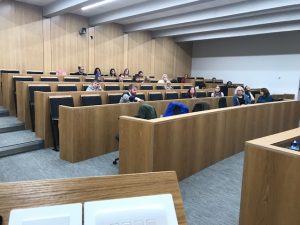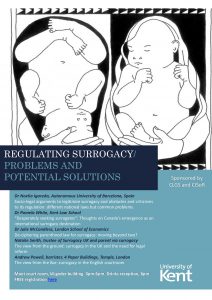On 19 November 2017, Dr Kirsty Horsey of Kent Law School (KLS), who runs the Surrogacy Law Reform Project, hosted an afternoon workshop looking at the possibilities for the regulation of surrogacy. The workshop was co-sponsored by CISoR and the KLS Centre for Law Gender and Sexuality. ‘REGULATING SURROGACY: PROBLEMS AND POTENTIAL SOLUTIONS’ saw 35 attendees from many different institutions – not all academic – come to hear perspectives on the problems presented by the existing law on surrogacy in three different nations: the UK, Canada and Spain, as well as potential solutions in the form of ideas for reform.
Visiting scholar Dr Noelia Igareda from the Autonomous University of Barcelona, Spain spoke on ‘Socio-legal arguments to legitimize surrogacy and obstacles and criticisms to its regulation: different national laws but common problems’. Surrogacy is currently prohibited in Spain but, as with many nations in the same situation (or where it is difficult to access surrogacy), couples travel overseas to enter surrogacy arrangements. Thus, even with prohibition, Spain has some of the same problems as other nations, and there are calls within Spain for surrogacy to be permitted and regulated. Dr Pamela White, from Kent Law School, spoke on ‘“Desperately seeking surrogates”: Thoughts on Canada’s emergence as an international surrogacy destination’. Canada faces a different problem from Spain, with its relatively liberal stance on surrogacy making it a destination of choice for people from other nations seeking to become parents through surrogacy. Pamela looked at the ethical and legal problems this creates and how legal reform might help.
Three other speakers addressed the situation in the UK, where there have been many and increasing calls for legal reform in recent years, and which may in fact occur, with the Government having given its support to the Law Commission’s review of the existing law, announced in December 2017. Natalie Smith, trustee of the non-profit surrogacy organisation Surrogacy UK and herself a parent via surrogacy, spoke about ‘The view from the ground: surrogacy in the UK and the need for legal reform’. Natalie presented findings from a working group on surrogacy law reform, which she is part of alongside Dr Horsey and others, and which published a report called ‘Surrogacy in the UK: myth busting and legal reform’ in late 2015, examining the realities of surrogacy practice and making recommendations for law reform. Since then, the working group has continued to campaign for change, including working with MPs and peers to secure debates in parliament and, more recently, becoming the secretariat for an All Party Parliamentary Group on Surrogacy. Andrew Powell, a barrister from 4 Paper Buildings, Temple, London, presented ‘The view from the Bar: surrogacy in the English courtroom’. Andrew has represented parties in numerous surrogacy cases before the courts, and has first-hand experience of the shortcomings of the existing law, making his a very interesting perspective. Lastly, Dr Julie McCandless, at the time from the London School of Economics, but now a Senior Lecturer in Kent Law School, presented an alternative option for lawmakers thinking about reform. In her paper ‘De-ciphering parenthood law for surrogacy: moving beyond two?’ she questioned why the law has remained so wedded to a child only having two ‘real’ or legal parents, especially when there is collaborative effort between more than two parties (each with a potentially legitimate claim to parenthood) in the means of its creation.
What all the presentations – along with the lively discussion from the audience – showed was that there is lots to consider when looking at how to reform the law on surrogacy – in all three countries!

